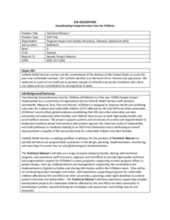Displaying 1761 - 1770 of 2509
This phenomenological study explored the “lived” experience of OoHC from the perspective of 4 adult care leavers reflecting on their childhood.
The purpose of this study is (1) to examine trends in placement use and placement stability since the reform and (2) to document the current frequency of each type of placement setting, the cumulative time in care before the exit to permanency, and the sustainability of the permanency outcome.
This handbook showcases science-based interventions that have been demonstrated effective in promoting attachment security, this is a vital reference and clinical guide for practitioners.
This qualitative study examined caregivers' experiences with SafeCare®, an evidence‐based programme that focuses on child neglect through modules on health, safety, and parenting.
CRS is recruiting for a 4Children Senior Technical Advisor to provide technical and programmatic assistance in the design, planning, implementation, monitoring, and reporting of country buy-ins and global program implementation.
This webinar, from the U.S. National Child Traumatic Stress Network, as part of its Childhood Traumatic Grief e-learning series, describes the impact of traumatic separation, attachment, and attachment disruption on children and adolescents.
This study contributes to current research on the behavior problems of children in foster care by analyzing a more comprehensive set of concurrent child history and contextual predictors.
This article compares blank care order application templates used in four countries (England, Finland, Norway, and USA (California)), treating them as a vital part of the ‘institutional scripts’ that shape practice, and embody state principles of child protection.
UNICEF is seeking a Senior Child Protection Specialist for Children and Armed Conflict (CAAC).
This report describes the disproportionality of children from racial and ethnic minorities in the foster care system in Arizona and how the overwhelmingly white, Anglo-American makeup of the Foster Care Review Boards leads to cultural bias in ths sytem and can perpetuate this problem.

